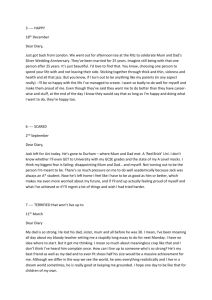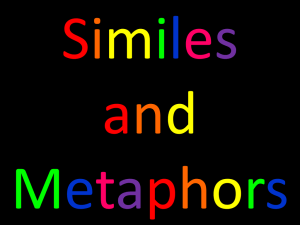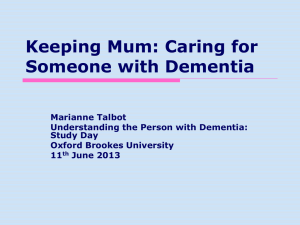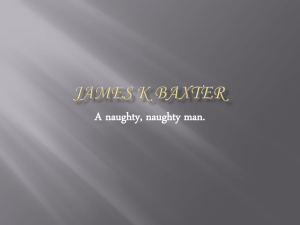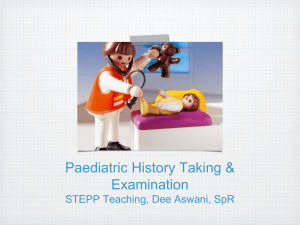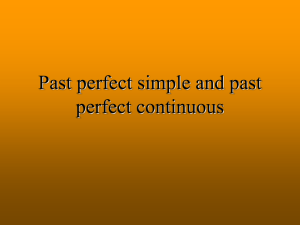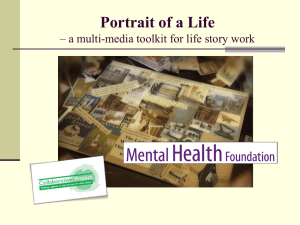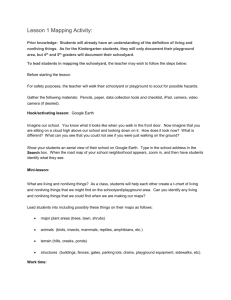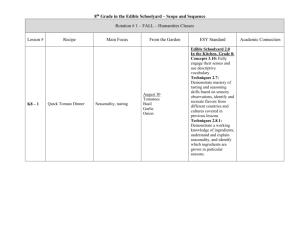Read a Sample Translation of the Plan
advertisement
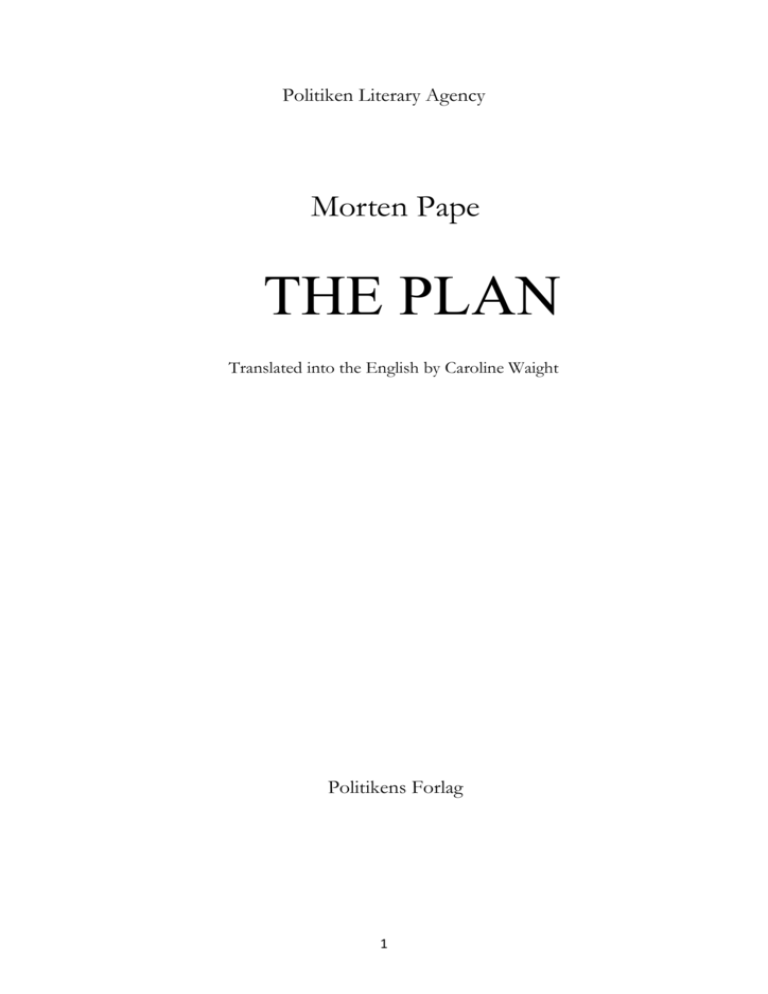
Politiken Literary Agency Morten Pape THE PLAN Translated into the English by Caroline Waight Politikens Forlag 1 Part One 2 ‘Scum’ When his head struck the ice, a tremor ran through Amager from end to end. The island’s tectonic plates shifted, sparrows were startled from their frostbitten branches, and somewhere far away from the leaden misery of the Project there were people who lost everything they held dear in the earthquake that followed. A tyrannosaurus rex could have come tap-dancing through the ghetto in that moment, and not even the drunks glued to the floor would have noticed. I’d always admired my father’s size and bulk, but all at once he was a beaten man. A human colossus with a fighting weight of a hundred and forty kilos, painstakingly honed over nearly forty years of smoking, poor nutrition and an endless stream of booze, he crashed back-of-thehead-first into the elements and his own hubristic unwillingness to disappoint his playful son, who’d just wanted a game of football. Winded, he lay in the snow as silent as an angel. A few odd snowflakes hung in the air as if on invisible strings, Dad’s nicotine-heavy breath freezing into clear, pure crystals of tar, and with a nimble little flick of my heel I lobbed the ball over him and sent it skittering between the rusty goalposts. It was only when the earth began to turn again some seconds later that I noticed the pool of blood slowly expanding across the icy asphalt pitch like a self-inflating cushion beneath my dad’s bald head. He was dead. Fuck. Right before my eyes – and it was all my fault. 3 Prologue The sun rarely makes its way into the Project; it’s hiding from everything that lurks just around the corner. The enormous concrete apartment blocks cast long, rectangular shadows across uneven pavements, potholed carparks and asphalt paths half-heartedly patched up, like a wounded body someone’s tried to stitch back together without anaesthetic, out of thick flaps of skin and a needle and thread. The thousands of tiny pebbles in the concrete stare at you like the pupils of an army of ossified spiders, until you daren’t look any longer, for fear that they’ll blink back. The shadows fall across the many trees that were once planted here, across the bushes once used to hide drugs, the swing sets and playgrounds where people once brought children. Dark and unyielding, they unfurl across the Centre, a ghost town where the people are as hard done by as the buildings. No one will do anything about the bullet holes by the pub, or the protection money the owners have been made to pay several times over. The shattered glass in the baker’s window – right where the cinnamon rolls and the cheap, cheerful cakes with the sprinkles used to sit, waiting for schoolchildren to come at lunchtime and stare at them with hungry eyes – is boarded up with three magazines, a bit of gaffer tape and a few planks of wood from the builder’s. Heading into the corner shop to buy sweets for a krone, you can take your chances either with the seagull droppings or the splashes of drunks’ vomit as you step into the dark space, where empty shelves and marked-down multi-packs sit beside rows of magazines filled with naked women, all sold by a spaced-out Pakistani with a crumpled shirt, a candy-striped paper bag in his hand and a wooden bat under the counter. The drunks, swaying and grunting like a pack of zombies as they weave among us, wander back and forth from the bench by the school to the corner shop, fetching empty bottles to exchange for a few new ones. They don’t like them too cold; they’d rather have them lukewarm, so they’re easier to knock back. On rainy days the horizon looks like two slimy, monochrome planes slotted together, as toneless and grey as the concrete itself. On the benches in front of the school sit the winos and junkies and people on the dole, while the younger pupils throw stones and broken glass at the drunks, just to make them stagger up in a fit of rage and chase the little bastards five yards before tripping over their own feet and level of inebriation, so high it breeds overconfidence in a split second. The first time I saw a dead man, he was lying on his stomach with his head veined in blood, crushed flat against the ground like mincemeat, his pale hand gripping a shopping bag full of broken beer bottles. He’d shat himself. Raindrops slithered off his pockmarked skin, greasy even in death, which seemed at once premature and 4 overdue. The words embroidered in yellow on the back of his dirty beanie read World’s Best Granddad. A battered car, its wheel rims and number plate missing, swings sharply round the corner and pulls up in the middle of the street. Smoke and loud music from a crackly sound-system are the only signs of life within it. A couple of guys in puffer jackets, black baseball caps and shoes that were once a shiny white head towards the car. One of them fetches a sports bag from the boot while the other keeps glancing around as he chats to the driver through the rolled-down window. A hand gesture, a few transparent baggies and an Arabic greeting are exchanged before the car is jerked into gear, nearly mowing down an alcoholic carrying gin in a milk carton over by the post office. It’s closed now, and no longer sells stamps to masked men with guns. The door to the schoolyard has scarcely opened before the substitute teacher realises he’s walking straight into hell. I catch sight of him as soon as he steps outside; he’s already given up. His legs won’t work anymore. They won’t take him any further, and he stops mid-movement. He’s got to keep going, however, so he takes three more strides over the metal grating and plants his trainers on the ground as the door slams shut behind him. He’s now on his own for the next fifteen minutes in Dyveke School’s chaotic playground. Many years ago they used to dump all the city’s junk and litter in this part of town. They called it Shit Island, and it was where they hid all the ugliness. These days it’s impossible to ignore the symbolism. It’s a place you don’t want your children anywhere near, a zone of infinite disorder where the offspring of the proletariat whirl madly around in a frantic dance of war, their skin-tones worn like uniforms. Pasty white boys like myself are in a minority. There are more headscarves than tutus and more Arabic songs than hopscotch. The grown-ups say it’s because we go to school in the middle of a ghetto. That means there are lots of migrant workers in a specific residential area. But it doesn’t matter, they say, because we’re all here together. The sight of the chaos in the schoolyard this Tuesday, a little after nine thirty, bears out that particular point. Over by the entrances to corridors one and two, where the little kids have their classes, an army of children in snowsuits, their stomachs full of sugary breakfast cereals, are charging around by the battered and faded playground with its wooden castles and the rope bridge that ends in a low slide, its surface rusted over like a rotten tongue and loose nails sticking out of the sides. There’s a resounding bang from this half of the schoolyard each time one of the boys slams another one against the surface of the slide before letting him roll down towards the other crying 5 children. A few further crashing sounds by the old bus stops in the corner of the yard are succeeded, predictably, by a shriek or a howl, then crying, and after that laughter, all of it drowned out by the other screams competing with the boys’ shouts and swearwords to rise above the whole hopeless, hysterical inferno. The substitute teacher’s fingers are gripping the handle of his coffee mug, a cheap porcelain thing with a faded print of the local council’s logo. He examines the fluorescent green reflective vest with helpless eyes as he tries to work out how to put it on without setting down the mug and abandoning all hope of looking like an adult. The coffee confers authority, indicating that here is a person whose word is law in this schoolyard. He can discipline the children and separate them when they get into fights. He reminds himself of that, taking a sip from the mug. The coffee is already cold. He’s not yet learned to like the bitter, chalky taste of the staff-room brew. His mind returns to the stupid fluorescent vest. A new initiative, it’s supposed to make the staff member on duty more visible among the students. He stands there like a little boy lost in a changing room. No mother, no help. With a little wriggle of his neck he manages to get the vest on, but it makes no difference. Every hesitant movement – his whole being, in fact – radiates vulnerability, beads of nervous sweat forming on his skin, and in this schoolyard that’s something you can smell at thirty paces. This will be the longest fifteen minutes of his life. Until the next time the bell goes, and the neighbourhood children need to be supervised once more. I know how he feels. I’m sitting on the bench that runs along the building opposite, a substitute player in our game against the kids from 3.x. It’s gradually turned into a proper derby, a grudge match between the players from both classes whose wizardry with a ball is undisputed. And then there’s me and Thomas. They call us the Two Spazzes. We’re only good for standing in goal, just getting in the way, and we’re not even very good at that. Being first and second goalie, respectively, for the class team is the only experience we have in common with the other boys at school. Apart from that we’re left to our own devices and each other’s company, which we’ve had since we were very young and suddenly discovered one day that we lived opposite each other. The ball comes rocketing over the asphalt. I can hear the sound of grazed skin when it gets close enough. It hits me square in the middle of my glasses, and suddenly I can’t see a thing. The right lens has fallen out. Always the right one. Tinnitus is ringing in my ears, the beautiful, monotonic sound of failure. Now I’m searching, my whole head down by the asphalt, half-blind, scrabbling around for the lens in hope and desperation as my heart pounds violently but irregularly beneath my slightly too-thin autumn jacket. My 6 hands grope around, finding a half-disintegrated slice of tomato and mayonnaise. I jerk back my arm, instinctively wiping the unwelcome gunk on the edge of the bench. With my other hand I try again, scanning the ground with my still-functional left eye, and then at last I catch sight of the round piece of glass, hidden in relative safety some distance underneath the bench. My guts contract like a hedgehog when I’m unable to hold my breath any longer and have to inhale the stench of the school toilets. The pungent potpourri of smells – notes of ammonia and old honey sandwiches – nearly makes me throw up into the discoloured sink in front of me. No wonder nobody uses this place. No wonder we sit in class all day, squirming with stomach cramp. But it is a wonder that I don’t take more advantage of it. For the first time, I realise how nice it is to be alone in here. The rest of the world can take care of itself, hustling and bustling to its heart’s content, so long as it doesn’t see me. The stalls are covered in scribbled pen and graffiti, and some of the locks to the gappy wooden doors have been smashed, but you can’t see straight off which of them still work, so you have to try your luck. The soap dispenser is whitish where it isn’t rusty. Everyone in school knows you shouldn’t try and get soap out of the soap dispensers. As a rule they’re always empty, and if you do manage to get something out if them, it’s not going to be anything that makes your hands clean. The lens clicks smoothly back into place; I’ve done this a hundred times before. There’s a new scratch now, though. If I’m lucky, maybe Mum won’t see it. I rinse the glasses in lukewarm water, place them back on my nose and let them drip onto my face as I involuntarily end up staring at myself in the mirror. When I look at my reflection I see a boy I don’t want to be. He’s pathetic, with pudgy cheeks, thin, mousy hair and glasses that make him look exactly like the nobody he is. There are tiny bits of gravel embedded in his forehead – decoration left by the ball. He seems like the kind of kid who might burst into tears at the drop of a hat. I gaze at him, and I can’t feel anything but sympathy. I want to grab his arm and make a run for it. He looks like a fellow comrade, like he’d understand everything. I catch another glimpse of the fluorescent vest as I leave the toilets. The substitute teacher is sipping at his coffee, but I can see that he’s not really drinking it. For him it’s just nicer to stare down into the mug than out into the world, at least the world of this neighbourhood. Perhaps that’s why he doesn’t notice the five small boys encircling him until it’s too late. I recognise a few of them from the youth centre. Rashid, Ali and Jehanzeb. The other two I don’t know, but I think they’re part of the same family as Duygu. The substitute teacher’s eyes suddenly fly wide open and he’s forced to engage with the world once more. The boys stand there expectantly, gazing up at him with smiles I haven’t seen before. 7 The first gobbet comes from Rashid, who’s standing behind the substitute’s back. It gets him right in the neck, and the substitute spins around to face his assailant. The next gobbet, Ali’s, hits his left ear. Again he whirls halfway round before the third gobbet sticks to the hollow of his throat. The substitute teacher’s lukewarm coffee strikes the icy surface of the schoolyard, the handle still firmly hooked in his shaking fingers. After hit number four he starts shrieking blue murder at the eight-year-old sharpshooters, but Jehanzeb darts behind his back and spits one final time. I look up at the big clock. One minute left. My lips taste salty. I close my eyes and see nothing anymore; all I hear are other people’s lives, amid my own darkness and the stillness I’m drawn to. I squeeze my eyes shut as hard as I can, trying to withdraw as deep as possible into my own skull. I wish nobody could see me. I curse my own existence, refusing to belong here. The longer my eyes are closed, the more clearly I can see what I need. Mum, bending down and hugging me tightly. Dad lifting me up in the hall, so that the top of my head brushes the ceiling. Both of them are smiling, both of them care about me, and wordlessly they reassure me that it’s all going to be ok once more. I open my eyes to an empty schoolyard and Miss Bahnsen sticking her head out of the doorway, furious because I didn’t show up to her class. ‘Now, please, Mr Pape!’ 8 1 As a general rule, Dad sits by himself on the long leather sofa while Mum knits on the slightly shorter model next to it. He smokes one fag after another, when he isn’t rolling next day’s supply with his red machine, which can conjure a brand new cigarette out of paper and tobacco, ready to tap into shape. Every now and again his practised dexterity lets him down, and he brushes the wayward pieces of ash from the gradually disappearing fag off his T-shirt and sofa with the flat of his hand. They float down towards the rest of the dust on the living room’s unsanded parquetry, as I lie on my stomach, clad in pyjamas, exploring the long cracks between the wooden boards. It’s no longer possible to distinguish between the dust bunnies, cigarette ash and dead skin cells. I lift my head a fraction, just until it begins to pinch, mainly as a way to pass the time, and sneak a furtive glance at my father and his enormous legs, exposed in football shorts. His calf muscles are disproportionally huge, like Popeye’s forearms from the knees down. His thighs are of similarly swollen dimensions, especially at times like this evening, when he rests them on the edge of the leather sofa, his legs spread wide as if he’s trying to give his cock and balls some air while he’s got the chance. I wonder what could possibly be irritating him down there, since he spends so much time sticking his hand down his underpants to have a good scratch. Afterwards he’ll rub his moustache with the same hand, taking two quick sniffs, one after the other, through his broad nostrils, which are filled with small, sturdy black hairs that are always curling out towards the rest of his face. When he digs around deep inside his nose with his finger, inspecting his wispy snot before removing it from his nail with his bottom teeth after a brief moment of appraisal, I always look away as if nothing had happened. Instead I gaze at the action figure that lies blanketed in dust and cobwebs in the filthy grotto beneath the sofa. Dad is watching the prime minister’s New Year’s speech. Mum’s just knitting. It’s the first day of 1993. New Year’s Eve was conducted, as usual, with modest enthusiasm. I didn’t really understand what was festive about it, all those rituals, the anticlimactic indoor fireworks and ugly-smelling party blowers I could never figure out how to unfurl to their full potential, let alone my parent’s champagne-tinged breath. I just didn’t get it. The whole New Year’s thing. It faded little by little, the outgoing year, like a dying runt, and meanwhile the neighbours let off cheap fireworks they’d got from over the border, holding them in their hands as usual, mailboxes were sabotaged by skyrockets, the sound of whistling bathed the whole concrete jungle in perpetual tinnitus, and at least one kid I knew would 9 inevitably wake up in the new year pet-less, because his rabbit hutch had got blown to smithereens by a chrysanthemum firework. By the time my Mum had put her glasses on the coffee table as usual, taken a hand-rolled Prince from the box and begun bawling her eyes out at the Queen’s Speech, I had already given up hope of any change or deviation from the relentless predictability of tradition. Out by the dining table next to the kitchen, my dad was busy fastening Pernille into her high chair, while the potatoes boiled in the cast-iron pot they’d saved up for when they were young and had only just met. Dad cleaned his hands with washing-up liquid and lit a cigarette, prodding at the contents of the pot with a fork. He couldn’t give a shit about the queen, the royal family or the fatherland. He was only interested in hearing what the prime minister had to say in his speech the following day. And in eating. There was nothing he wouldn’t shovel into his mouth, preferably all in one go. He ate as much in a single evening as the rest of us consumed across a whole day. He loved steaks and chops, and bacontopped mashed potatoes were his favourite. He could eat that every day no matter what, he said with his mouth full of mash. Instead we had oven-baked cod with waxed lemons and a generous pinch of dried herbs from the spice rack in a seldom-visited corner of the kitchen cabinet. Boiled white potatoes that steamed all the way up to the ceiling light, where my name was still written in dust on the surface. Frozen baguettes, made edible in the blink of an eye, after less than ten minutes in the oven. Mum had broken them up into small pieces, passing them to my little brother Jonas and me with a sharp reminder that the bread had reached dangerous temperatures. The table had been laid with a paper tablecloth printed with exploding rockets and party hats. A framed print of Monet’s purple-and-bluish waterlilies hung by itself on the otherwise nicotine-stained walls. White wine for the grown-ups and kids’ champagne for Jonas and me. Before Pernille had managed to get the first spoonful of baby food into her mouth, we were pretending to be the winos who sat on the benches opposite our school. We were frighteningly accurate and convincing in our roles. ‘Cheers, you old bastard!’ I yelled in a voice as dry as dust, and clinked my glass against my brother’s so hard that the liquid sloshed around with the impact. He laughed in short gasps as he tried to come up with an answer inside his five-year-old head. ‘Cheers mate, bugger it all!’ ‘That’s enough!’ Mum slammed her fist down on the table so hard the cutlery leapt off the paper cloth and the cod’s heart nearly sprang back to life. There was silence at the table until an ear-splitting boom from a firecracker just outside the front door gave us all a fright, not least Pernille, who dropped her food as she opened her mouth to squeal. When I was in a mood like this I could get so insanely sick of staring at 10 the half-bald little squirt, who could do nothing but eat and cry, or sometimes the other way round. She sat there at the foot of the table like she owned the place, drinking and eating and spitting up then crying some more, then sleeping and waking and wailing all over again. She was much better at acting drunk than me or Jonas could ever hope to be, no matter how much kids’ champagne we knocked back. ‘What the fuck?!’ shouted my mum, reaching for the kitchen roll to wipe the sobbing little monarch around the mouth. Dad heaped a few more boiled potatoes onto his plate. ‘Are you just going to sit there while they burn our shed down?!’ she continued. Pernille’s crying was swelling in intensity, and Jonas and I picked at the cod with our forks as if we were looking for gold among its thin bones. Dad sighed and heaved himself to his feet, sliding the chair back so that it grated in my ears. As he struggled to stand he exposed his hairy suitcase of a stomach, which had long since won the battle with his shirt’s lower buttonholes. His heavy tread as he manoeuvred past the table and out towards the hallway, his feet in white tennis socks, made the parquet flooring creak even more than normal. From around the table we could hear him unlock the front door, shout something in the peculiar way he always did, with a shrill, high-pitched whine, which was answered only by the fireworks’ indifferent inferno. Then he shut the door again, gave the handle an extra tug to make sure it was locked, and plodded back to his seat, picking up the bowl of potatoes. All that remained was the sound of fumbling cutlery and snivels from the end of the table. Calm descended once more, a sorely needed hush which I would later come to learn was the silence of repressed rage. New Year’s was shit. The new year wouldn’t be a single fucking iota better or different than the last. And with each passing day Mum and Dad looked more and more like two people who didn’t have the guts to confess that they’d discovered much too late they couldn’t stand each other. 11

